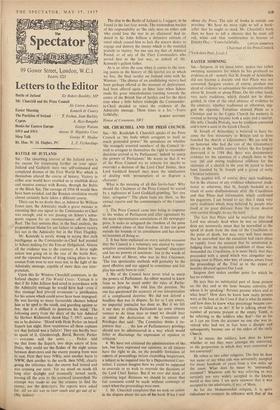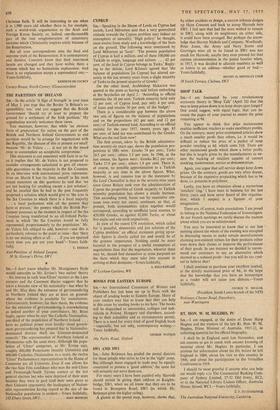EASTER MORNING
SIR,—Surgeon, in his latest letter, makes two rather sweeping statements for which he has produced no evidence at all—namely that St. Joseph of Arimatheea did not become a disciple and that Pilate was not converted. Surgeon cannot, of course, produce one shred of evidence to substantiate his statements either about St. Joseph or about Pilate. On the other hand, very early traditions, which should not be disre- garded, in view of the total absence of evidence to the contrary, whether traditional or otherwise, sug- gest the . opposite. Tertullian claimed Pilate as a Christian and in the Coptic Church his memory is revered as having become both a saint and a martyr. His wife, Claudia Proeula, was by tradition converted and is now a saint in the Greek Church.
St. Joseph of Arimathxa is believed to have be- come the first missionary to Britain and to have founded the church at Glastonbury. We arc told by an historian who had the run of the Glastonbury library in the twelfth century before the fire largely destroyed it in 1184 that there was documentary evidence for the existence of a church there in the year 166 and strong traditional evidence for the existence of a church in the year 66 stated to have been founded by St. Joseph and a group of early Christian believers.
The sceptics will, of course, deny such traditions, but in the absence of any evidence whatsoever, tradi- tional or otherwise, that St.. Joseph backslid as a result of some disillusionment after the Crucifixion and that Pilate had information which confirmed his paganism, I am bound to say that I think very early traditions which were believed by people who lived at no great distance from the event deserve very careful thought, to say the least.
The fact that Pilate said he marvelled that Our Lord was already dead when he was so informed does not necessarily mean that he marvelled at the speed of death from the time of the Crucifixion to the point of death, but may very well have meant that he marvelled that the execution had taken place so rapidly from the moment that he sanctioned it. Judging from the hysterical condition of those who demanded the Crucifixion, it is more likely that they proceeded with a speed which was altogether sur- prising even to Pilate, who was, of course, aware from the proceedings of the Trial as to the extent of hostility directed against Our Lord..
Surgeon then makes another point for which he has no evidence.
He says that no substantial part of those present on the day and at the hour became converts. Of whom is he speaking? Persons present where and at what hour? How does he know how many persons were at the foot of the Cross if that is what he means, and how does he know what percentage became con- verts or failed so to do? If he is talking about the number of persons present at the empty Tomb, is he referring to the soldiers who fled?—for so far as I can see from the account no one else was in- volved who had not in fact been a disciple and subsequently become one of the elders of the early Church.
If he means the soldiers, how ,does he know whether or not they were amongst the converted, or the proportions in which they were converted or not converted?
He refers to two other religions. The first he does not name or say what cult was universally accepted for Many hundreds of years from a few miles up the coast. What does he mean by 'universally accepted"? Whatever cult he was referring to was certainly not very widely accepted in the known world at that time. I am quite unaware that it was accepted by the inhabitants, if any, of Mars.
As for the Mohammedan religion, it is quite ridieulous.to compare its influence with that of the
Christian faith. It will be interesting to see when it is 1,900 years old whether there is, for example, such a world-wide organisation as the Arab and Foreign Koran Society, or, indeed, one-thousandth part of the vast conglomeration of missionary societies which Christianity inspires solely because of he Resurrection.
But all your correspondents miss the final and supreme truth of the Resurrection. It is contemporary and decisive. Converts know that their innermost hearts are changed and they have within them a witness which has no humanistic explanation. And there is no explanation except a supernatural one.— Yours faithfully, KENNETH DE COURCY
Cerney House, North Cerney, Gloucestershire



































 Previous page
Previous page